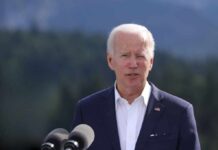
In a move that has drawn sharp criticism from industry and political circles, the Biden administration announced a pause on the permitting process for several major liquified natural gas (LNG) terminals along the Gulf Coast this week.
The decision, seen by many as a concession to radical climate activists and environmental groups, places a significant roadblock in meeting rising European demand for LNG exports, especially in the wake of Europe’s efforts to reduce its dependency on Russian natural gas.
Energy Secretary Jennifer Granholm, addressing the press, highlighted the need for a comprehensive review of export applications, emphasizing economic, environmental, and national security considerations. She stated, “This action includes a pause on pending applications for exports of U.S. natural gas as LNG to non-free trade agreement countries until the department can update the underlying analyses for authorizations.”
"Can you share the amount of greenhouse gas emissions [Biden's ban on liquified natural gas projects] would cut?"
Biden "climate advisor" Ali Zaidi: *word salad* pic.twitter.com/NdebGyNcMS
— RNC Research (@RNCResearch) January 26, 2024
However, the American Petroleum Institute, a leading industry trade organization, has criticized the decision. They argue that it undermines U.S. global energy leadership and benefits adversaries like Russia while harming U.S. allies and job opportunities domestically. The API’s stance is that no further review is necessary to understand the benefits of U.S. LNG in stabilizing global energy markets and aiding the transition to cleaner fuels.
The environmental lobby, once supportive of natural gas as a cleaner alternative to coal or oil, has shifted its stance, arguing that LNG contributes negatively to climate change. Recent studies have raised concerns about LNG’s environmental impact, possibly worse than coal, and its ability to meet future European demand.
President Biden pauses approval of liquid natural gas exports because of "climate concerns" and TOTALLY NOT because he's trying to economically sanction Texashttps://t.co/UQteN9DIPehttps://t.co/UQteN9DIPe
— Not the Bee (@Not_the_Bee) January 27, 2024
Biden gave Gov. Abbott a 1 PM EST deadline to remove his National Guard troops
Abbott refused
So Biden issued punitive sanctions against Texas by pausing liquid natural gas development opportunities, which will directly hurt the Texas economy
That’s not a coincidence
This is… pic.twitter.com/G7ADGluMWb
— DC_Draino (@DC_Draino) January 26, 2024
Amid these developments, the Biden administration’s climate policy has been marred by contradictions. Despite positioning himself as a climate-focused president and taking significant steps like passing the Inflation Reduction Act and setting ambitious emission reduction goals, Biden’s tenure has also seen a surge in oil and gas production, the highest in U.S. history.
The decision to halt LNG projects has international ramifications as well. Europe, striving to reduce its reliance on Russian natural gas, especially in the middle of the Ukraine conflict, finds itself in a precarious position. This halt in U.S. LNG exports could inadvertently force European nations to seek resources from Russia, potentially strengthening Moscow’s hand.
Sen. Dan Sullivan (R-AK) was outspoken this week in criticizing the administration’s decision. On the “Cats & Cosby” show, Sullivan accused the Biden administration of pandering to far-left interests at the cost of American energy independence and environmental benefits. He alleged that the decision to pause LNG exports empowers Russian President Vladimir Putin by pushing other countries toward Russian gas.
Meanwhile, Joe Biden issued a statement emphasizing climate change as a critical reason for the pause, committing to a thorough review of the impacts of LNG exports on energy costs, security, and the environment. He contrasted his administration’s approach with the “denial” of climate urgency by “MAGA Republicans.”
The timing of this decision, coinciding with Biden’s conflict with Texas over border security issues, has led to speculation about political motivations. Critics suggest that the pause on LNG exports might serve as an economic sanction against Texas, a state pivotal in LNG production. This adds another layer to the debate, intertwining energy policy with broader political conflicts within the United States.
















